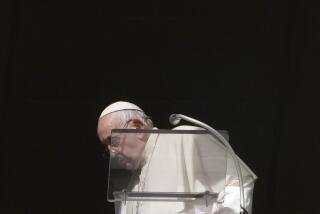Amid Croats’ Adulation, Pope Renews Calls for Peace : Balkans: He tells crowd ‘historic realism’ requires accommodation among warring ethnic groups.
- Share via
ZAGREB, Croatia — Pope John Paul II climaxed his first visit to the former Yugoslav federation Sunday amid the electric adulation of hundreds of thousands of followers and sobering new calls for Balkan peace.
The 74-year-old pontiff was strong-voiced at a three-hour Mass in this capital of predominantly Roman Catholic Croatia, but he maneuvered with difficulty on a right leg broken in April.
“The leg troubles him, but his spirits are very high,” said the Rev. Roberto Tucci, a senior papal aide.
An elevator at the back of a three-story papal altar at the racetrack here spared John Paul the steep, 27-step climb, and aides helped him in and out of cars and his Popemobile.
But the strain of the journey showed in his face. Italian photographers who take pictures of the Pope for a living returned from a morning photo session at the presidential palace with sadness in their eyes. “He doesn’t look good at all,” one photographer said.
John Paul looked very good, by contrast, to jubilant Croats who applauded every step of the first Pope to visit a city where Christianity came 900 years ago. Organizers estimated the racetrack crowd at between 500,000 and 750,000--cowled, contemplative nuns, young people in peasant dress, city families, the disabled in wheelchairs and big, young soldiers in berets, all basking in the chords of a 230-voice choir.
Addressing them, the green-robed John Paul made the most of his stay in the only part of the former Yugoslav federation he has been able to visit; the Pope is not welcome among Serbian leaders in Belgrade, and security concerns forced him to scrap last week’s scheduled visit to Sarajevo, the capital of war-torn Bosnia-Herzegovina.
“Raise up your ardent and trusting plea for peace,” the Pope urged in a Mass homily he delivered in Serbo-Croatian and directed not only to Croats but also to Serbs and Muslims. “The present tragic division and tensions must not make us forget that there are many elements today that unite the people at war. . . .
“Peace in the Balkans--I emphasize strongly in this time of suffering--is not a utopia! Rather, it is necessary from the point of view of historic realism.”
The Pope won his biggest applause when he drew an analogy between religious faith and the Sava River, which bisects Zagreb.
“Faith in this region, today so sorely tried, must return to be a unifying and beneficial force like the rivers that flow through it. I am thinking of the River Sava, which, beginning in Slovenia, flows through your country across the borders of Croatia and Bosnia-Herzegovina through Serbian land, into the Danube. . . . Two rivers that meet are called to unite many peoples, just as the two expressions of Christianity must do--Western and Eastern--that have always coexisted in these lands,” he said.
Roman Catholics, Orthodox Christians and Muslims have dwelt together in the Balkans for a millennium, he noted, adding, “It is not lawful to attribute to religion the phenomenon of nationalistic intolerance which is raging in this region.”
Representatives of Croatia’s Muslim minority attended the papal Mass on Sunday, and a leader of Zagreb’s small Jewish community welcomed the Pope in a brief address to the crowd.
The Serbian Orthodox Church, however, declined invitations to the Mass, Vatican officials said. Serbian spokespersons have publicly accused the Vatican of siding with Croatia in the Balkans vortex of ethnic violence.
In a speech at Zagreb’s airport before his departure for Rome, the Pope urged his listeners: “Dare to forgive and welcome others. . . . To forgive means to free the heart from the feeling of revenge which is not compatible with the civilization of love.”
More to Read
Sign up for Essential California
The most important California stories and recommendations in your inbox every morning.
You may occasionally receive promotional content from the Los Angeles Times.













